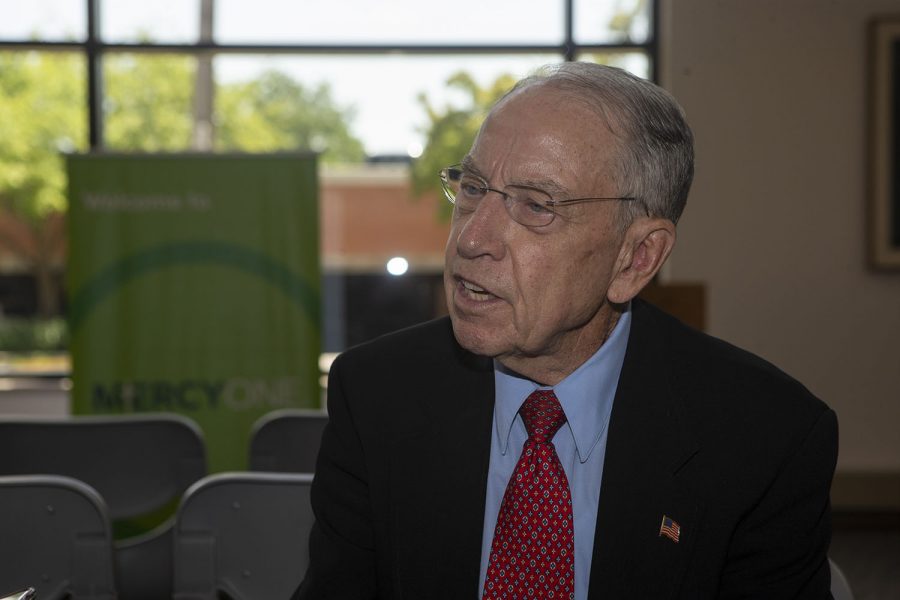Iowa’s members of Congress work from home amid pandemic
As the COVID-19 pandemic pushes millions of workers across the country out of physical office spaces, Iowa’s representatives in Congress and their staff are having to adapt to new working conditions.
U.S Senator Chuck Grassley, R-Iowa, speaks with the Daily Iowan staff after a visit to Mercy Hospital on July 2, 2019.
April 19, 2020
Members of Iowa’s congressional delegation, like millions across the country, are having to adjust their work environment as social distancing requirements close many offices and drive most staff to work from home.
Representatives and senators, most from their homes in Iowa, are holding virtual town halls with constituents and meeting with staff and policy stakeholders over video.
In a press call with reporters on April 16 from her home in Red Oak, Iowa, Sen. Joni Ernst, R-Iowa said she hadn’t had physical contact with staff in weeks, but she is continuing work via Zoom meetings, webinars, phone calls, and FaceTime.
Ernst said this new work environment has put a spotlight on the importance of strong rural broadband.
“Technology has really come to the forefront in what we’re doing,” she said, “And I love it, because it is really emphasizing, even during this pandemic, the necessity for rural broadband, and I’m getting more and more of my colleagues buying into this now, and the need to support efforts to connect rural America to metro centers.”
Ernst, who is on several Senate committees, also said she was maintaining her workload in those areas in addition to COVID-19 issues. She has been in calls with the Department of Defense and members of Iowa’s agricultural community recently.
“Same workload level, it’s just done all remotely now,” she said.
In press calls with reporters this month, Sen. Chuck Grassley, R-Iowa, said his offices in Washington D.C. are closed, and his staff is working from home and fielding emails from constituents.
Grassley said he’s been having remote conversations with cattle and pork producers and small business leaders about how the pandemic has affected their operations.
Grassley is at his home in New Hartford, Iowa while the U.S. Senate is on recess, and he said he was limiting his time outside. He is still taking email and phone correspondence, and his office is receiving hundreds of emails a day from constituents, he said.
“We’ve had a lot of questions on the Payroll Protection Program,” he said in an April 9 press call. “…And also, on the [stimulus] paychecks, when they’re going to go out.”
Reps. Abby Finkenauer and Dave Loebsack, D-Iowa, and Steve King, R-Iowa, have all directed staff to work from home, spokespeople from their offices said.
“The congresswoman, and the office, continues to engage with constituents in Iowa’s First Congressional District via email, social media, telephone-town halls, and video meetings,” a spokesperson for Finkenauer said. “The office continues to seek input from Iowans to shape the priorities that are needed to help hard-working families make it through this crisis.”
Rep. Cindy Axne, D-Iowa, said in an email to The Daily Iowan that staff in her Iowa and Washington D.C. offices are meeting virtually, and she has been holding virtual town halls in the 16 counties across Iowa’s 3rd Congressional District.
Axne, who is up for reelection in November, said the vast majority of her work recently has been focused on COVID-19. She said members of her district were reaching out and speaking at town halls about how the pandemic was affecting them.
The biggest concern Axne said she was hearing from her constituents was about the health of their families. She also said she was hearing from business leaders, nonprofits, farmers, and others about the financial impacts of the pandemic and working with them to plan further financial assistance measures from Congress.
Following the historic $2.2 trillion CARES Act passed and signed by President Trump on March 27, Politico reported Sunday that a new $400 billion federal aid package is expected to be announced in the coming days.
“I hear from hundreds and sometimes thousands of constituents every week – and during COVID-19 has been no different,” she said. “People need their representatives to know what help they need from them, and in this time the vast majority of those messages have focused on this pandemic.”



